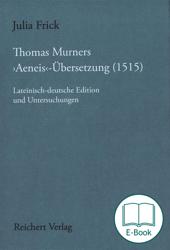The first ever German translation of Virgil's 'Aeneid' is that of the Franciscan, doctor of theology, jurist and poeta laureatus Thomas Murner (1475-1537). Its cultural and literary historical significance is documented on the one hand by its affiliation to the environment of the dedicatee, Emperor Maximilian I, and on the other hand by the deliberately staged humanist gesture of the author: Murner, according to the preface, "has refreshed Vergil's work from Latynschem todt in tütsches leben". The present work fulfils a longstanding desideratum - an edition of Murner's work. It offers the German 'Aeneid' in the historical mode of use intended by Murner: the German text is synoptically juxtaposed with Murner's Latin original. Because Murner's translation of the 'Aeneid' is one of the 'unread' texts of the early modern period, the studies take up a number of thematic segments that can point research in possible directions and pave the way.
Julia Frick studierte Germanistik und Latinistik an der Albert-Ludwigs-Universität Freiburg. Von 2013–2016 arbeitete sie als wissenschaftliche Mitarbeiterin im DFG-Projekt zur Erstausgabe von Thomas Murners ›Aeneis‹-Übersetzung unter der Leitung von Prof. Dr. Nikolaus Henkel und wurde am 06.06.2016 promoviert. Seit August 2016 ist sie wissenschaftliche Assistentin am Lehrstuhl von Prof. Dr. Susanne Köbele, Ältere deutsche Literaturwissenschaft, Deutsches Seminar, Universität Zürich. Ihr Habilitationsprojekt gilt der Kurzfassungen mittelhochdeutscher Epen des 13. Jahrhunderts.
Die „Münchener Texte und Untersuchungen zur deutschen Literatur des Mittelalters“ (MTU) sind eine international hochrenommierte Reihe der germanistischen Mittelalterforschung. Sie stellt ausgewählte editorisch und methodisch-analytisch orientierte Arbeiten von Fachkollegen aus dem In- und Ausland für die wissenschaftliche Öffentlichkeit bereit. Publikationssprachen sind Deutsch und Englisch. Die Reihe versteht sich als Forum für Publikationen zur Grundlagenforschung (Editionen, Untersuchungen zur Überlieferungs- und Textgeschichte, Standardrepertorien aus den Bereichen der material philology) wie auch für analytische Beiträge zur aktuellen Methodendiskussion anhand exemplarischer Untersuchungen.


 Preface
Preface